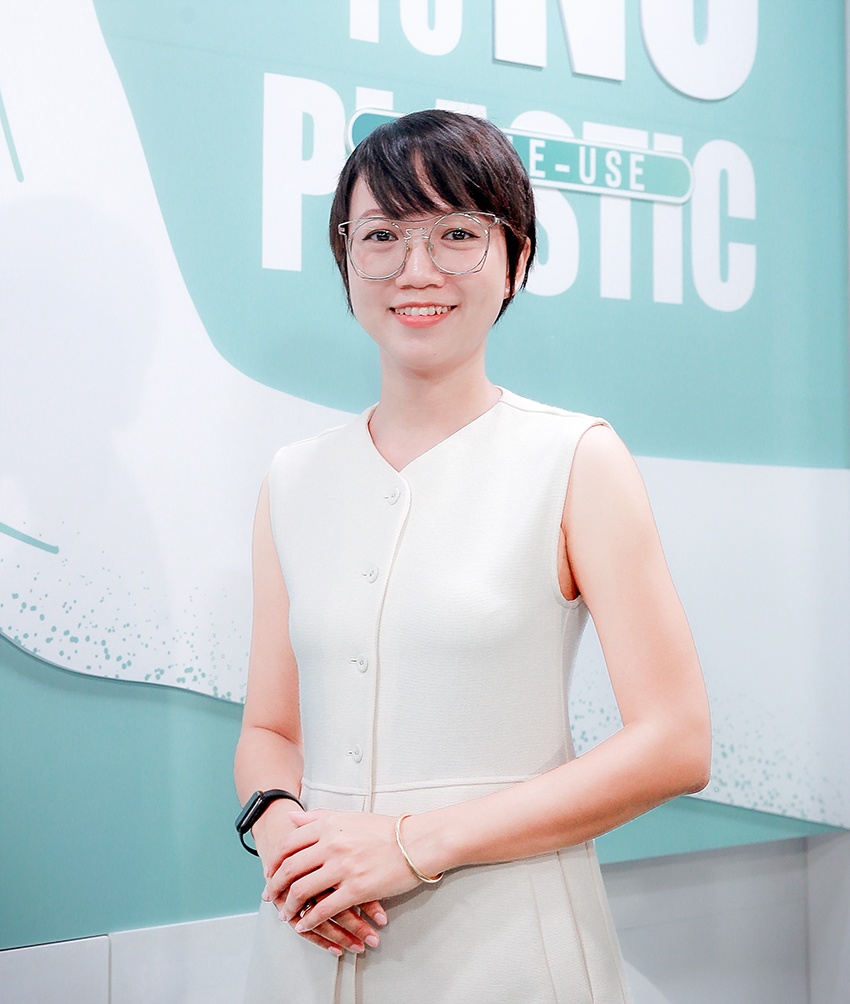AEON determined to fortify green lifestyle
 |
| Nguyen Bang Lang, in charge of Sustainable Development at AEON Vietnam |
The convenience and low cost of plastic packaging are omnipresent in the retail and service industries. What is your opinion on the use of these products?
As a Vietnamese person, I’ve witnessed these challenges every day. I have three points on the use of single-use plastics in Vietnam. The first relates to the cheap cost of the material. The cost of plastic including in a product or transaction is barely noticeable, so both seller and consumer should have no difficulty in making decisions to use or not use them.
The next point is that the techniques as well as facilities in Vietnam are not yet ready to support businesses in changing to more sustainable alternatives. The final point is that the after-use process has not been developed yet. In detail, we have no standardised system to classify, recycle, or treat the material. So, we don't have anything to support resolving plastic usage.
When it comes to encouraging customers to switch to eco-friendly alternatives when shopping, has AEON Vietnam implemented any programmes or activities?
We launched plastic-reduction initiatives in 2019 with the hope that we can support consumer behaviour to be more sustainable and collaborate with other stakeholders like government, authorities, partners, employees for system-level impact. Under the project, we have three important missions.
First is to facilitate the habit of refusing plastic bags for customers and employees. We also launched an initiative for customers to rent an eco-bag when they come to AEON. For example, instead of spending VND20,000 (86 US cents) to buy a new eco-friendly bag, customers can deposit VND5,000 (21 US cents) to rent one bag, use it, and return it to us the next time so that they can receive their deposit back.
In addition, we are improving our operations to minimise single-use plastic bags consumption. For example, in the past, one transaction at the cashier counter can consume up to five bags to ensure customer convenience, as well as safety and hygiene standards. However, we have now optimised the process and reduced the maximum number of bags to just three.
And finally, the third mission is to accompany the government regarding the sustainable consumption direction. We are one of 16 active members of the Plastic Alliance to Reduce Single-use Plastic Bags. We believe that, together with other retailers, we can create a case study for the government to have a firm foundation for upcoming legal changes.
Since implementing these activities, what have been the proudest achievements so far?
Well, we can divide our achievements into two types. The first is what we call the data - the tangible achievement. AEON Japan started a plastic reduction campaign in 1991, and after 30 years, about 80 per cent of its customers regularly say no to plastic bags. Here, we have implemented the project for two years. We’re proud to say that we have achieved a 5 per cent rate, a decent start for AEON Vietnam.
But I think the achievement that we are most proud of is the value that we create. At AEON, we follow the basic principle of contributing to the local community, reflecting through every strategy and action.
However, this would be one-sided love without the help of customers. Based on the data, we strongly believe that customers will eventually support us. Customers are shifting behavior gradually. Coming to AEON, customers are empowered to willingly say no to plastic bags, and not because AEON forces them to do so.
Do you have any wishes or suggestions for government agencies?
I believe in the power of multi-stakeholder collaboration. The government has already done a great job by setting up and informing us about the action plan until 2030 and upcoming legal changes.
If all businesses, regardless of industry, create impact within and beyond their organisation following the government’s direction, by the time we launch those new policies, both consumers and businesses will be both ready and happy.
What the stars mean:
★ Poor ★ ★ Promising ★★★ Good ★★★★ Very good ★★★★★ Exceptional
Related Contents
Latest News
More News
- Trung Nam-Sideros River consortium wins bid for LNG venture (January 30, 2026 | 11:16)
- Vietnam moves towards market-based fuel management with E10 rollout (January 30, 2026 | 11:10)
- Envision Energy, REE Group partner on 128MW wind projects (January 30, 2026 | 10:58)
- Vingroup consults on carbon credits for electric vehicle charging network (January 28, 2026 | 11:04)
- Bac Ai Pumped Storage Hydropower Plant to enter peak construction phase (January 27, 2026 | 08:00)
- ASEAN could scale up sustainable aviation fuel by 2050 (January 24, 2026 | 10:19)
- 64,000 hectares of sea allocated for offshore wind surveys (January 22, 2026 | 20:23)
- EVN secures financing for Quang Trach II LNG power plant (January 17, 2026 | 15:55)
- PC1 teams up with DENZAI on regional wind projects (January 16, 2026 | 21:18)
- Innovation and ESG practices drive green transition in the digital era (January 16, 2026 | 16:51)

 Tag:
Tag:




















 Mobile Version
Mobile Version